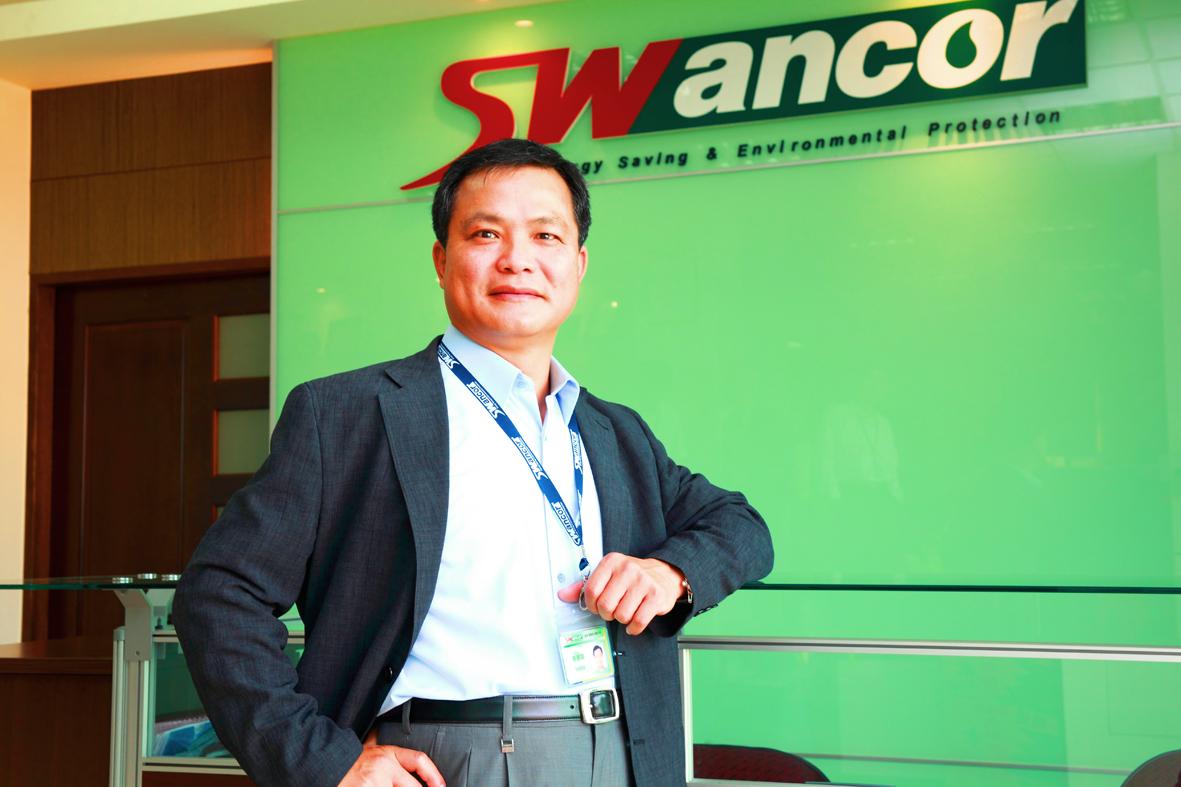Resins and composite materials manufacturer Swancor Holding Co Ltd (上緯投控) expects this quarter’s revenue to remain the same as last quarter despite the effects of traditional seasonality, after last quarter’s revenue was the highest in the company’s history.
Third-quarter revenue was NT$3.01 billion (US$104.44 million), up 27.5 percent from the previous quarter and 95.7 percent from a year earlier, due to increased orders for its wind power resins and carbon-fiber composite materials, the company told an investors’ conference in Taipei on Thursday.
The company’s fine chemicals business reported that its revenue last quarter rose 66.22 percent year-on-year to NT$2.51 billion, accounting for 83 percent of Swancor’s overall revenue, while its carbon fiber business reported that revenue surged 1,570 percent to NT$501 million, contributing 17 percent of its total revenue.

Photo: Chang Hui-wen, Taipei Times
Swancor’s better-than-expected sales outlook for this quarter came after its consolidated revenue for last month reached a record high of NT$1.16 billion, up 3.76 percent month-on-month and 118.04 percent year-on-year.
The company’s revenue has reached record highs for seven consecutive months, indicating sustained order growth and bringing cumulative revenue in the first 10 months to NT$5.15 billion — an annual increase of 48.03 percent, it said.
Swancor chairman Robert Tsai (蔡朝陽) said that the company remains positive about its outlook for next year, forecasting that sales of its carbon-fiber composite materials would grow as much as 80 percent, and sales of its environmental protection and anti-corrosion materials would increase 10 to 20 percent.
As for sales of wind turbine blade resins, Tsai said that the company expects to maintain flat growth in China this year, but it has nonetheless secured two clients outside of China to help contribute to its revenue next year.
The company’s goal is to become a world leader of wind power materials by 2022 and secure more than 25 percent of Asia’s anti-corrosion materials market by 2025, Tsai said.
The company also aims to take more than 25 percent of the global blade materials market and 30 percent of the global market for carbon-fiber composite materials used for wind power by 2025, he added.
Swancor’s carbon-fiber composite materials business would continue to benefit from wind turbines getting larger and the rapid growth of offshore wind power demand, analysts said.
The company would likely penetrate the supply chain of international vendors, as it has received orders from MHI Vestas Offshore Wind A/S, they said.
Swancor reported net profit of NT$221.19 million in the third quarter, down 11.2 percent quarter-on-quarter, but up 381 percent year-on-year. That translated into earnings per share of NT$2.41.
In the first three quarters, net profit totaled NT$516.22 million, up from NT$462.52 million a year earlier, while earnings per share were NT$5.63 over the period.

NEW IDENTITY: Known for its software, India has expanded into hardware, with its semiconductor industry growing from US$38bn in 2023 to US$45bn to US$50bn India on Saturday inaugurated its first semiconductor assembly and test facility, a milestone in the government’s push to reduce dependence on foreign chipmakers and stake a claim in a sector dominated by China. Indian Prime Minister Narendra Modi opened US firm Micron Technology Inc’s semiconductor assembly, test and packaging unit in his home state of Gujarat, hailing the “dawn of a new era” for India’s technology ambitions. “When young Indians look back in the future, they will see this decade as the turning point in our tech future,” Modi told the event, which was broadcast on his YouTube channel. The plant would convert

‘SEISMIC SHIFT’: The researcher forecast there would be about 1.1 billion mobile shipments this year, down from 1.26 billion the prior year and erasing years of gains The global smartphone market is expected to contract 12.9 percent this year due to the unprecedented memorychip shortage, marking “a crisis like no other,” researcher International Data Corp (IDC) said. The new forecast, a dramatic revision down from earlier estimates, gives the latest accounting of the ongoing memory crunch that is affecting every corner of the electronics industry. The demand for advanced memory to power artificial intelligence (AI) tasks has drained global supply until well into next year and jeopardizes the business model of many smartphone makers. IDC forecast about 1.1 billion mobile shipments this year, down from 1.26 billion the prior

People stand in a Pokemon store in Tokyo on Thursday. One of the world highest-grossing franchises is celebrated its 30th anniversary yesterday.

Zimbabwe’s ban on raw lithium exports is forcing Chinese miners to rethink their strategy, speeding up plans to process the metal locally instead of shipping it to China’s vast rechargeable battery industry. The country is Africa’s largest lithium producer and has one of the world’s largest reserves, according to the US Geological Survey (USGS). Zimbabwe already banned the export of lithium ore in 2022 and last year announced it would halt exports of lithium concentrates from January next year. However, on Wednesday it imposed the ban with immediate effect, leaving unclear what the lithium mining sector would do in the